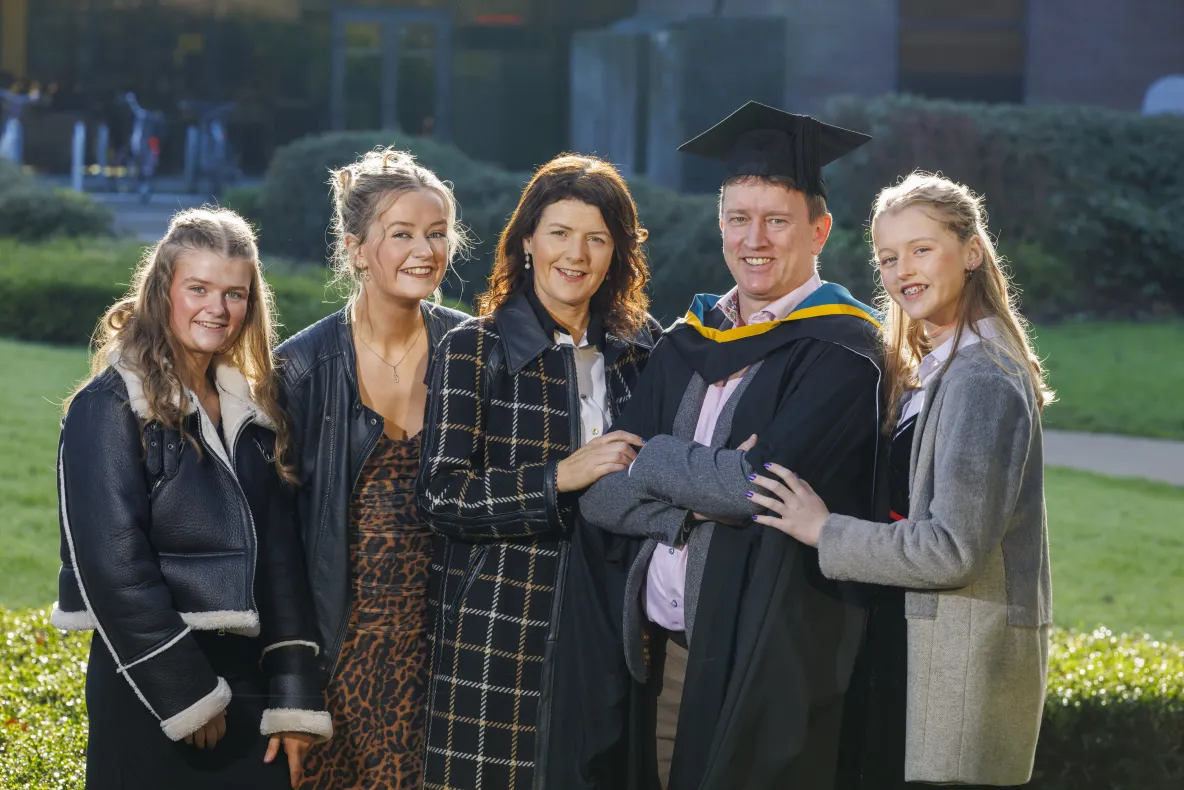
A University of Limerick student who has struggled with dyslexia has defied the odds stacked against him on his journey in education as he graduates with an MA in Guidance Counselling and Lifespan Development.
Martin Nunan from Tullamore, has dedicated his career to providing support and challenging the stigma around learning disabilities. He is one of 1,705 new graduates being conferred at UL this week.
“I am driven by the ability to advocate for others, to see equality in every strand of our education and career journeys. To tell people that they can achieve their dreams. I often say, ‘Aim for the stars, to land on the clouds’, explained Martin”
Having failed Leaving Certificate Irish, Martin was determined to continue his educational journey with his sights set on a career in counselling. He enrolled in a community college in Dublin as a pathway to allow him to progress to study psychology at Coventry University, UK.
“I knew that I was good with people, I knew that I could relate to people and I could understand people, it was the perfect fit for my personality and approach in life.”
Martin who is now the proud owner of two undergraduate and two master’s degree qualifications, enjoyed the social aspect of school but found it difficult to keep up with his work. Frustrated by challenges related to his learning disability, he was teased for his deficits and became more interested in anything to do with being outdoors and out of the classroom.
The range of difficulties he experienced at school varied from poor spelling, difficulty with calculation, getting overwhelmed when trying to take notes, being misunderstood when trying to communicate a point and even forgetting what he wanted to say when his hand was up in class. Despite his struggles, Martin was not formally diagnosed with dyslexia in school.
“It was a harsh school environment because they didn't have support for me, I was often referred to as being stupid, thick, silly, and I was never in the smart category.”
Martin reflected on the many misconceptions about, for example, how his dyslexia affects his language and communication skills, and often forces him to overthink and miss the point or opportunity to speak.
“Dyslexia is so much more than spelling and grammar. My head is often like a web, when I come up with an idea or thought, it spirals out of control. It can affect my sleep, it can affect my mood, it can affect the way I think,” he explained.
After struggling through secondary school, Martin was asked to complete a dyslexia assessment after he became a student at Coventry University.
“I remember being called into the Dean's office shortly after my first paper was submitted and he asked me why I didn’t inform the college that I was dyslexic. To which I answered, 'I'm not dyslexic’.”
After completing the test, he was told that he was in the moderate to severe range on the dyslexia spectrum.
Martin is now a practicing counsellor with a specific focus on neurodiversity and disabilities alongside general practice. He runs a counselling and guidance service called Éisteacht, based in Tullamore. He has also been working as a student support lead with Institute of Integrative Counselling and Psychotherapy (IICP) and Hibernia College and hopes to use his new qualification to make a difference for those with all kinds of disabilities.
“I hope to make waves in the area of guidance counselling, supporting people with neurodivergent conditions, but equally to those who feel stuck, who are looking for change.”
Throughout his career he has also worked in the disability sector, for over 25 years he has worked with several organisations, including the Health Service Executive (HSE), Acquired Brain Injury Ireland (ABII), and the Irish Rugby Football Union (IRFU) where he worked on the establishment of Disability Rugby.
“For people with disabilities, there is no career guidance structure or lifespan thinking and I feel that this is still an area that can be and should be grown,” he said.
The years he spent doing his master’s at UL was the first time in his educational journey where Martin felt that he was treated as an equal in an academic setting and his struggles were recognised. This allowed him to flourish.
“To hear lectures ask more about dyslexia and my learning style to help them help me, was really eye-opening and empowering.
“I wasn't afraid to say I was dyslexic in class. I found our course director Dr Petra Elftorp to be hugely supportive and open and transparent in understanding my dyslexia and how it impacted me and always on hand to offer additional support as and when I needed it.”
When asked about what propels him forward in his chosen career Martin said; “Hope propels me forward. Hope for students with dyslexia that now career guidance can lead them to the paths that they want for themselves with the hope that they can navigate education and career paths of their choosing.”
Having completed a dissertation on positive reframing previously which involves thinking about a negative or challenging situation in a more positive way, Martin’s message is “to believe that we can always get to where we want to go, we all have challenges but nothing is impossible when I’m possible.”